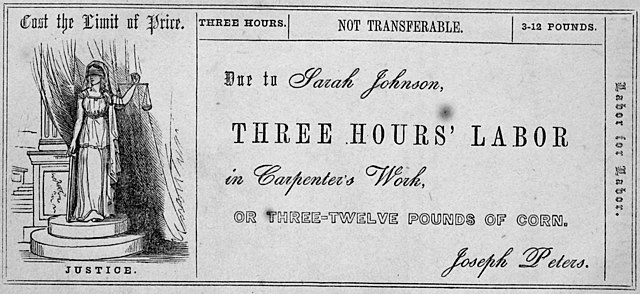A financial transaction is an agreement, or communication, between a buyer and seller to exchange goods, services, or assets for payment. Any transaction involves a change in the status of the finances of two or more businesses or individuals. A financial transaction always involves one or more financial asset, most commonly money or another valuable item such as gold or silver.
Financial transaction involving money and agricultural goods at a farmers' market
Silver coin of the Maurya Empire, from the 3rd century BC
Purchases can be made through the use of physical currency, such as cash.
In trade, barter is a system of exchange in which participants in a transaction directly exchange goods or services for other goods or services without using a medium of exchange, such as money. Economists usually distinguish barter from gift economies in many ways; barter, for example, features immediate reciprocal exchange, not one delayed in time. Barter usually takes place on a bilateral basis, but may be multilateral. In most developed countries, barter usually exists parallel to monetary systems only to a very limited extent. Market actors use barter as a replacement for money as the method of exchange in times of monetary crisis, such as when currency becomes unstable or simply unavailable for conducting commerce.
An 1874 newspaper illustration from Harper's Weekly showing a man engaging in barter by offering various farm produce in exchange for his yearly newspaper subscription.
Scandinavian and Russian traders bartering their wares. Olaus Magnus, 1555
'White traders bartering with the Indians' c. 1820
A 19th-century example of barter: A sample labour for labour note for the Cincinnati Time Store. Scanned from Equitable Commerce by Josiah Warren (1846)







